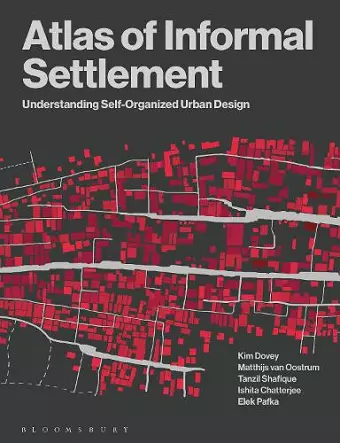Atlas of Informal Settlement
Understanding Self-Organized Urban Design
Kim Dovey author Matthijs van Oostrum author Tanzil Shafique author Ishita Chatterjee author Dr Elek Pafka author
Format:Paperback
Publisher:Bloomsbury Publishing PLC
Published:5th Oct '23
Should be back in stock very soon

The first book to map the processes by which informal settlements and slums grow and develop, presenting 50 contemporary case studies of informal settlements from over 30 cities across the Global South.
While often seen as unplanned or spontaneous, informal settlement is better understood as a mode of production: a co-evolution of architecture, urban design and planning that embodies informal rules and shapes urban development.
The Atlas of Informal Settlement is a comparative study of the spatial logic of informal settlement based on mapping and analysing the evolution of urban form (morphogenesis) in 51 contemporary settlements across the planet – the first of its kind and a fundamental change in thinking for urban studies and built environment professionals.
Each of the 51 case studies uses maps and aerial photographs to examine key stages of development, showing how informal settlement adapts to different contexts of political economy, topography, culture, climate and land tenure; revealing a complex range of actors from settlers and states to land mafias and pirate developers. It demonstrates the range of design processes and formal outcomes; how the informal becomes formalized and vice versa. Interspersed with short chapters introducing key theoretical concepts, the Atlas shows how such practices may or may not produce ‘slums’, and how settlement is already a form of ‘upgrading’.
Informal settlement is the primary mode of production of affordable housing and neighbourhood infrastructure within cities of the Global South; with detailed mapping and profiling of 51 settlements this book shows how such urban morphologies emerge in terms of architecture, urban design and planning.
The Atlas demonstrates the indispensable value that is generated by investigating the spatial logic of informal settlement, as this exposes factors often overlooked in broad-brush statistics and geospatial analysis based on artificial intelligence. Focusing on fifty-one sites, the Atlas offers a nuanced spatial analysis at different scale levels and reveals the processes and outcomes of self-organized urban design. In doing so, it offers learnings for context-sensitive policies for affordable housing and neighbourhood infrastructure in rapidly growing cities. * Raf Tuts, Director, Global Solutions Division, UN-Habitat *
We know very little about most of the informal settlements that house over a billion urban dwellers. This book advances and deepens our understanding of these settlements‘ development and expansion over time in all their diversity and complexity. * David Satterthwaite, International Institute for Environment and Development *
This is a vital empirical consolidation of the heterogeneous ways urban settlements are being composed and governed. The "informal" is always extending itself across new terrain and vernaculars; something always being worked and worked on in incessant processes of becoming unsettled and resettled. * AbdouMaliq Simone, Urban Institute, University of Sheffield *
A nuanced, highly accessible and thought-worthy text ... A major accomplishment * Journal of Urban Design *
One of the most ambitious attempts to date of comparative research ... What Dovey and his team have accomplished is impressive. * International Journal of Urban and Regional Research *
ISBN: 9781350295032
Dimensions: 244mm x 190mm x 18mm
Weight: 860g
304 pages